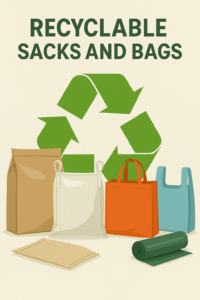 The global packaging industry is undergoing a significant transformation. With rising environmental concerns and stricter regulations, businesses are shifting toward eco-friendly packaging alternatives. Among the many solutions available, recyclable sacks and bags have emerged as one of the most effective and practical options. They combine durability, functionality, and sustainability while meeting the packaging demands of industries such as agriculture, food, construction, and retail.
The global packaging industry is undergoing a significant transformation. With rising environmental concerns and stricter regulations, businesses are shifting toward eco-friendly packaging alternatives. Among the many solutions available, recyclable sacks and bags have emerged as one of the most effective and practical options. They combine durability, functionality, and sustainability while meeting the packaging demands of industries such as agriculture, food, construction, and retail.
In this blog, we will explore the importance of sustainable packaging, the advantages of recyclable sacks and bags, their industrial applications, and why businesses must embrace them to stay competitive in today’s eco-conscious world.
Why Sustainable Packaging Matters
Sustainability is no longer a trend; it is a necessity. Traditional packaging materials such as single-use plastics and non-recyclable films have caused severe environmental challenges, including pollution, landfill waste, and harm to marine ecosystems. Governments and global organizations are pushing for packaging materials that can:
- Reduce waste and carbon footprint
- Promote reuse and recycling
- Protect resources for future generations
Consumers are also playing a critical role. Surveys show that more than 70% of customers prefer eco-friendly packaging and are willing to pay a premium for sustainable alternatives. Businesses that ignore this shift risk losing market share to more responsible competitors.
Recyclable Sacks and Bags: An Overview
Recyclable sacks and bags are made from materials that can be reprocessed and reused after their lifecycle. Unlike single-use plastic bags, these alternatives reduce waste generation and support a circular economy. Common recyclable materials include:
- Polypropylene (PP) woven sacks
- High-Density Polyethylene (HDPE) bags
- Low-Density Polyethylene (LDPE) bags
- Paper-based sacks with recyclable coatings
These products are designed for strength, durability, and multiple reuses while ensuring recyclability at the end of their usage.
Top Benefits of Recyclable Sacks and Bags
1. Environmental Responsibility
The most significant advantage is their reduced environmental impact. Since recyclable sacks and bags can be reused multiple times and eventually recycled, they minimize landfill waste and pollution.
2. Durability and Strength
Unlike flimsy single-use bags, recyclable options such as PP woven sacks are strong enough to carry heavy loads like grains, cement, fertilizers, or industrial chemicals. Their toughness reduces breakage, wastage, and replacement costs.
3. Cost-Effectiveness in the Long Run
While initial production costs may be slightly higher than conventional plastics, recyclable sacks and bags provide long-term savings due to reusability and reduced disposal expenses. Businesses also benefit from improved brand reputation and compliance with regulations.
4. Versatility Across Industries
Recyclable sacks and bags can be tailored to meet the needs of different sectors:
- Agriculture – Packaging for grains, rice, flour, seeds, and fertilizers.
- Construction – Heavy-duty sacks for cement, sand, and aggregates.
- Retail – Reusable shopping bags for consumers.
- Chemicals & Industrial – Resistant sacks for powders, resins, and additives.
5. Enhanced Branding Opportunities
These sacks can be printed with logos, brand colors, and product information, turning packaging into a marketing tool. Sustainable packaging also enhances brand image, showing customers that your company cares about the planet.
6. Compliance with Regulations
Many countries are enforcing plastic bans and sustainability laws. By switching to recyclable sacks and bags, businesses can ensure compliance while maintaining operational efficiency.
7. Contribution to Circular Economy
Every recyclable bag that re-enters the production cycle reduces the need for virgin materials. This contributes to resource conservation, energy savings, and a more sustainable economy.
Industrial Applications of Recyclable Sacks and Bags
Agriculture and Food Industry
Agriculture is one of the biggest users of sacks and bags. Recyclable PP woven sacks are ideal for storing and transporting rice, wheat, sugar, maize, and animal feed. Similarly, laminated recyclable bags protect food grains from moisture and contamination during long storage periods.
Construction and Infrastructure
Heavy-duty recyclable sacks are widely used for cement, sand, gravel, and other building materials. Their strength ensures safe transport, while recyclability makes them an environmentally responsible choice for large-scale infrastructure projects.
Retail and Consumer Markets
Reusable shopping bags made from recyclable polyethylene or polypropylene are rapidly replacing single-use plastic bags. They offer durability, reusability, and an eco-friendly image for retail businesses.
Chemicals and Industrial Packaging
Recyclable sacks are used for powders, resins, and industrial chemicals due to their resistance to tearing, moisture, and chemicals. They ensure product safety during transit while supporting sustainability goals.
How Businesses Benefit from Switching to Recyclable Packaging
Companies adopting recyclable sacks and bags enjoy a competitive edge:
- Customer Loyalty – Eco-conscious customers are more likely to choose sustainable brands.
- Global Market Access – Compliance with international standards opens export opportunities.
- Cost Savings – Reduced disposal costs and multiple reuses lower total packaging expenses.
- Positive Brand Image – Demonstrates corporate responsibility and commitment to sustainability.
Future of Sustainable Packaging with Recyclable Sacks and Bags
The demand for recyclable sacks and bags is expected to grow as industries and governments tighten environmental regulations. Innovations in biodegradable polymers, recycled raw materials, and hybrid packaging solutions will further strengthen their role in the future. Businesses that invest in eco-friendly packaging today will not only reduce their carbon footprint but also secure long-term growth in a sustainability-driven market.
Conclusion
Recyclable sacks and bags are more than just an eco-friendly alternative – they are a practical, durable, and versatile packaging solution for modern industries. From agriculture to construction and retail, they address the urgent need for sustainability without compromising performance.
At ISHA EXIIM, we provide a wide range of recyclable sacks and bags that meet international quality standards while supporting global sustainability goals. With 15+ years of expertise in polymers and industrial packaging, we are committed to helping businesses transition to eco-friendly solutions that make a difference.
